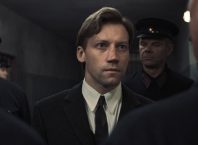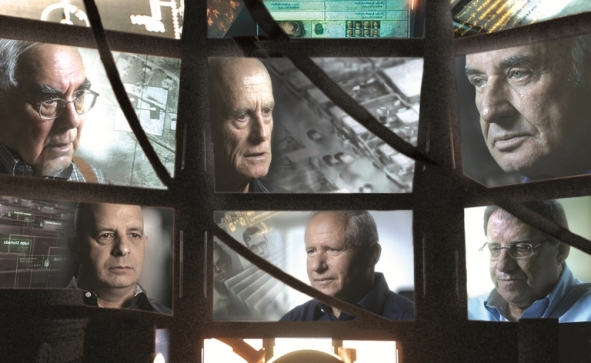
Even within the febrile context of Israeli politics, it is unusual – to say the least – for the immediate past head of an intelligence agency to criticise his political overseers in public. “My colleagues and I were very unsure of whether (Prime Minister) Netanyahu and (Defence Minister) Barak (could) lead an Iranian campaign,” Yuval Diskin, head of Shin Bet between 2005 and 2011, remarked recently in the Yediot Aharonot newspaper. “We were worried…that they would compromise Israel based on irrelevant considerations or via underhand ways.”
Shin Bet, the Israeli internal security service, has faced down any number of threats over the years. But arguably, its most potent challenge – giving context to Diskin’s denunciation – has consistently been its relationship with the nation’s political class. It is an enduring tension, and one that underpins The Gatekeepers, the excellent new documentary by Israeli filmmaker Dror Moreh.
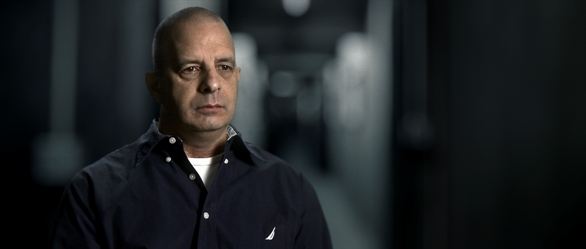
Discretion, it is fair to say, must be the trademark of any successful intelligence organisation – a point acknowledged by Shin Bet’s motto, Magen ve lo yera’e, the invisible shield. That said, in a democratic society this discretion – opaqueness may be a better description – must always be tempered by accountability. Needless to say, the two are not natural bedfellows. A tension between the two is inevitable, and become all the more evident when one factors in the…robust work carried out by the security apparatus on behalf on the state. But who takes responsibility for lacuna between the two?
Moreh, whose past work includes a candid bio-doc of Ariel Sharon, builds his film from an impeccable foundation, shaping his narrative through interviews with six of the seven immediate past heads of Shin Bet. (The seventh, Yossef Harmelin, passed away in 1994). This level of access is unusual in itself; coaxing his subjects to speak with candour, on the record, more so.
There is a danger inherent in the interview-led documentary, of the documentarian allowing oneself to to be seduced by the proximity to one’s subject. One might think of it as a cinematic Stockholm Syndrome. But it is a challenge that Moreh negotiates adeptly. Thoughtful juxtaposition of interviews with archive material ease the film away from the dry dominance of talking heads, allowing rather for a Rashomon-style convergence from differing perspectives.
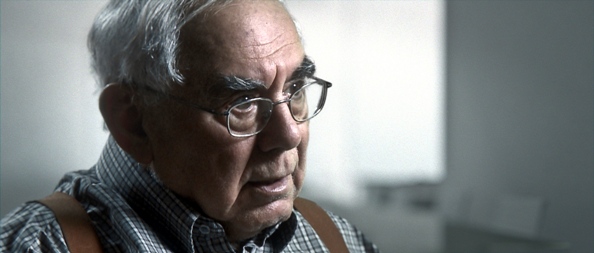
Invisible shields become all too visible in the wake of their failings, of which Shin Bet has experienced its fair share. The notorious Bus 300 affair, for instance. The capture, and subsequent release, of the Jewish Underground terrorist cell in the 1980s. The assassination of Yitzhak Rabin. Two Intifadas, and the consequent loss of life on all sides. The Gatekeepers is at its most revealing when exploring these affairs, posing difficult questions of its interviewees. “Morality? Go and ask the terrorists about morality” Avraham Shalom – head of Shin Bet between 1981 and 1986 – retorts, when challenged on the extra-judicial murder that defined the Bus 300 affair. (Four Palestinian bus hijackers were intercepted by Shin Bet and Army operatives. Two were captured alive and hearty – and were photographed thus by photojournalist Alex Levac – but turned up very dead a few hours later.)
Serious as these failings may be, they are but the detail that shape the big picture. The over-arching statement that weaves its way through The Gatekeepers, is the question of accountability. Despite being critical of their organisation, of themselves, occasionally of each other, the six gatekeepers unite around one assertion. It is one thing for the elected leaders of the country to expect Shin Bet to do the dirty work necessary to keep the country safe; another altogether to absolve themselves of responsibility, when things go wrong. The absence of a coherent political strategy to align Israeli and Palestinian interests is not in the interests of Israeli security: it is telling that all six assert that ultimately, the only alternative to talking with the enemy is conflict without end. A conflict in which – if we are to take this documentary at face value – Shin Bet will be the reluctant lead combatant.
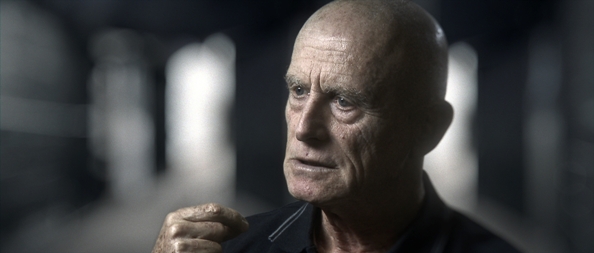
Diskin’s criticisms of Netanyahu, Barak and Lieberman in Yediot may seem indiscreet. But it seems that these are sentiments shared by others. Ami Ayalon, parachuted into the agency in the wake of the Rabin assassination, puts these reservations across most strongly. When he was a child, he says, he believed that there was a building in Jerusalem, where a wise old man sat in an office, behind a closed door, at the end of a long corridor on the second floor. This wise old man man – it is obvious that he is referring to David Ben Gurion, Israel’s first Prime Minister – agonised over the decisions necessary to keep the country safe.
Many years later, Ayalon goes to Jerusalem, and he finds himself in the building that he remembered from his childhood. He goes upstairs to the second floor; but there is no corridor, no closed door; most emphatically, there is no wise man debating the wisdom and justice of the decisions needed to keep Israel safe. The politicians, it seems, are happy to allow Shin Bet to be a law onto itself. That’s scary enough. That it takes veterans of Shin Bet to point out how wrong this is is scarier still.
The Gatekeepers (2012, 95 min., Hebrew with Hebrew/English subtitles)
A production of: Dror Moreh Productions, Les Films du Poaisson, Cinephil; In Co-Production with: Mac Guff, Wild Heart Productions, Arte France, IBA, NDR, RTBF; Co-Producer: Anna Van Der Wee; Associate Producers: Yael Fogiel, Laetitia Gonzalez; Producers: Dror Moreh, Estelle Fialon, Philippa Kowarsky; Director: Dror Moreh; Camera: Avner Shahaf; Editor: Oron Adar; Original Music: Ab Ovo, Jerome Chassagnard, Regis Baillet.
The Gatekeepers is currently screened at the Tel Aviv and Jerusalem Cinematheque, as well as select theatres.
Links: The Gatekeepers website, facebook page.

